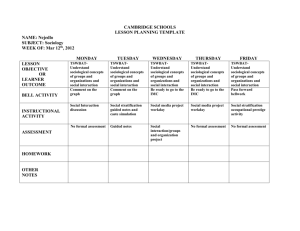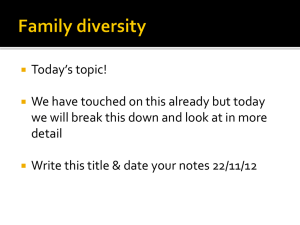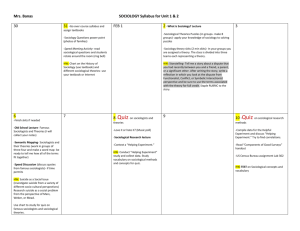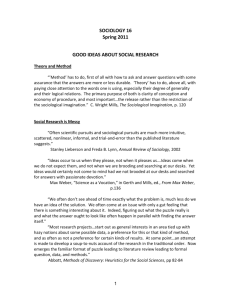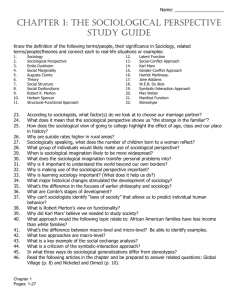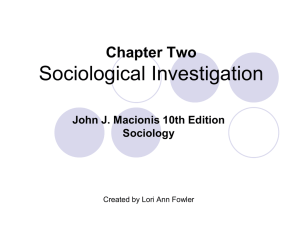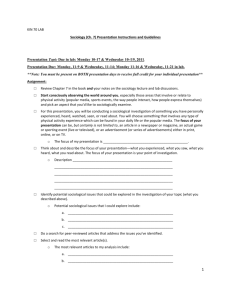Statement of Ethical Practice
advertisement
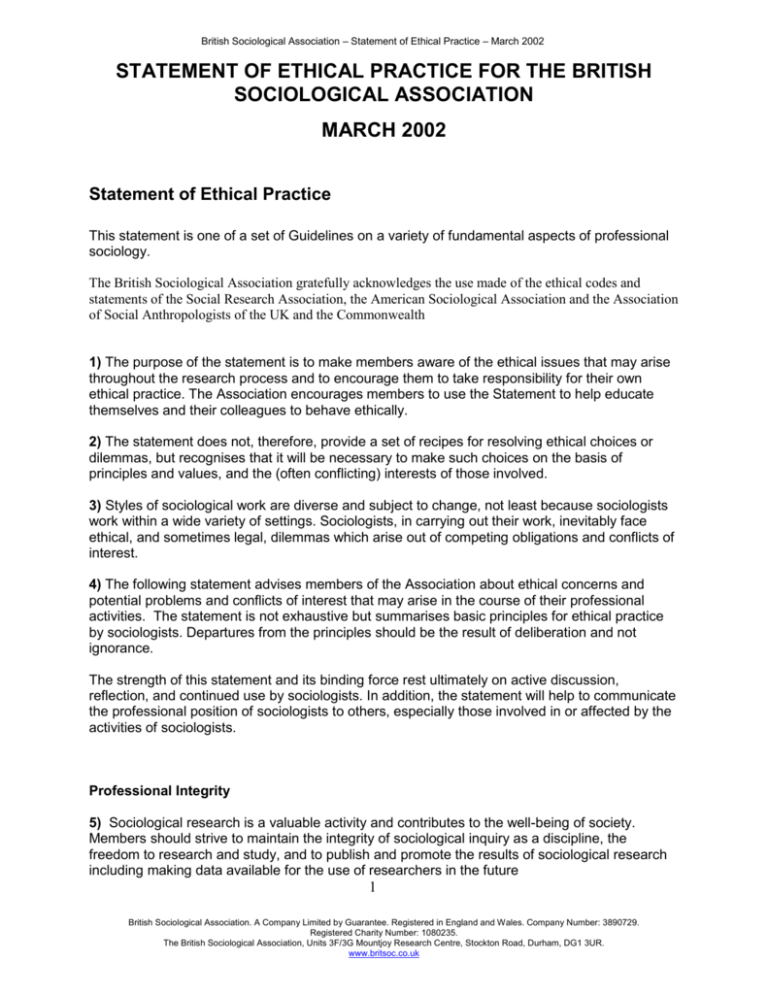
British Sociological Association – Statement of Ethical Practice – March 2002 STATEMENT OF ETHICAL PRACTICE FOR THE BRITISH SOCIOLOGICAL ASSOCIATION MARCH 2002 Statement of Ethical Practice This statement is one of a set of Guidelines on a variety of fundamental aspects of professional sociology. The British Sociological Association gratefully acknowledges the use made of the ethical codes and statements of the Social Research Association, the American Sociological Association and the Association of Social Anthropologists of the UK and the Commonwealth 1) The purpose of the statement is to make members aware of the ethical issues that may arise throughout the research process and to encourage them to take responsibility for their own ethical practice. The Association encourages members to use the Statement to help educate themselves and their colleagues to behave ethically. 2) The statement does not, therefore, provide a set of recipes for resolving ethical choices or dilemmas, but recognises that it will be necessary to make such choices on the basis of principles and values, and the (often conflicting) interests of those involved. 3) Styles of sociological work are diverse and subject to change, not least because sociologists work within a wide variety of settings. Sociologists, in carrying out their work, inevitably face ethical, and sometimes legal, dilemmas which arise out of competing obligations and conflicts of interest. 4) The following statement advises members of the Association about ethical concerns and potential problems and conflicts of interest that may arise in the course of their professional activities. The statement is not exhaustive but summarises basic principles for ethical practice by sociologists. Departures from the principles should be the result of deliberation and not ignorance. The strength of this statement and its binding force rest ultimately on active discussion, reflection, and continued use by sociologists. In addition, the statement will help to communicate the professional position of sociologists to others, especially those involved in or affected by the activities of sociologists. Professional Integrity 5) Sociological research is a valuable activity and contributes to the well-being of society. Members should strive to maintain the integrity of sociological inquiry as a discipline, the freedom to research and study, and to publish and promote the results of sociological research including making data available for the use of researchers in the future 1 British Sociological Association. A Company Limited by Guarantee. Registered in England and Wales. Company Number: 3890729. Registered Charity Number: 1080235. The British Sociological Association, Units 3F/3G Mountjoy Research Centre, Stockton Road, Durham, DG1 3UR. www.britsoc.co.uk British Sociological Association – Statement of Ethical Practice – March 2002 6) Members have a responsibility both to safeguard the proper interests of those involved in or affected by their work, and to report their findings accurately and truthfully. They need to consider the effects of their involvements and the consequences of their work or its misuse for those they study and other interested parties. Sociologists should note that there are national laws and administrative regulations (for example Data Protection Acts, the Human Rights Act, copyright and libel laws) which may affect the conduct of their research, data dissemination and storage, publication, rights of research subjects, of sponsors and employers etc.. 7) While recognising that training and skill are necessary to the conduct of social research, members should themselves recognise the boundaries of their professional competence. They should not accept work of a kind that they are not qualified to carry out. Members should satisfy themselves that the research they undertake is worthwhile and that the techniques proposed are appropriate. They should be clear about the limits of their detachment from and involvement in their areas of study. (Also see 45.-47) 8) Social researchers face a range of potential risks to their safety. Safety issues need to be considered in the design and conduct of social research projects and procedures should be adopted to reduce the risk to researchers. 9) In their relations with the media, members should have regard for the reputation of the discipline and refrain from offering expert commentaries in a form that would appear to give credence to material that, as researchers, they would regard as comprising inadequate or tendentious evidence. (Also see 20.-24). Relations with and Responsibilities towards Research Participants 10) Sociologists, when they carry out research, enter into personal and moral relationships with those they study, be they individuals, households, social groups or corporate entities. 11) Although sociologists, like other researchers are committed to the advancement of knowledge, that goal does not, of itself, provide an entitlement to override the rights of others. 12) Members should be aware that they have some responsibility for the use to which their data may be put and for how the research is to be disseminated. Discharging that responsibility may on occasion be difficult, especially in situations of social conflict, competing social interests or where there is unanticipated misuse of the research by third parties. Relationships with research participants 13) Sociologists have a responsibility to ensure that the physical, social and psychological wellbeing of research participants is not adversely affected by the research. They should strive to protect the rights of those they study, their interests, sensitivities and privacy, while recognising the difficulty of balancing potentially conflicting interests. 14) Because sociologists study the relatively powerless as well as those more powerful than themselves, research relationships are frequently characterised by disparities of power and status. Despite this, research relationships should be characterised, whenever possible, by trust and integrity. 2 British Sociological Association. A Company Limited by Guarantee. Registered in England and Wales. Company Number: 3890729. Registered Charity Number: 1080235. The British Sociological Association, Units 3F/3G Mountjoy Research Centre, Stockton Road, Durham, DG1 3UR. www.britsoc.co.uk British Sociological Association – Statement of Ethical Practice – March 2002 15 ) In some cases, where the public interest dictates otherwise and particularly where power is being abused, obligations of trust and protection may weigh less heavily. Nevertheless, these obligations should not be discarded lightly. 16) As far as possible participation in sociological research should be based on the freely given informed consent of those studied. This implies a responsibility on the sociologist to explain in appropriate detail, and in terms meaningful to participants, what the research is about, who is undertaking and financing it, why it is being undertaken, and how it is to be disseminated and used. 17) Research participants should be made aware of their right to refuse participation whenever and for whatever reason they wish. 18) Research participants should understand how far they will be afforded anonymity and confidentiality and should be able to reject the use of data-gathering devices such as tape recorders and video cameras. 19) Sociologists should be careful, on the one hand, not to give unrealistic guarantees of confidentiality and, on the other, not to permit communication of research films or records to audiences other than those to which the research participants have agreed. 20) Where there is a likelihood that data may be shared with other researchers, the potential uses to which the data might be put must be discussed with research participants and their consent obtained for the future use of the material.(iv). When making notes, filming or recording for research purposes, sociologists should make clear to research participants the purpose of the notes, filming or recording, and, as precisely as possible, to whom it will be communicated. It should be recognised that research participants have contractual and/or legal interests and rights in data, recordings and publications. 21) The interviewer should inform the interviewee of their rights under any copyright or data protection laws 22) Researchers making audio or video recordings should obtain appropriate copyright clearances 23) Interviewers should clarify whether, and if so, the extent to which research participants are allowed to see transcripts of interviews and field notes and to alter the content, withdraw statements, to provide additional information or to add glosses on interpretations 24 ) Clarification should also be given to research participants regarding the degree to which they will be consulted prior to publication. Where possible, participants should be offered feedback on findings, for example in the form of a summary report. 25) It should also be borne in mind that in some research contexts, especially those involving field research, it may be necessary for the obtaining of consent to be regarded, not as a onceand-for-all prior event, but as a process, subject to renegotiation over time. In addition, particular care may need to be taken during periods of prolonged fieldwork where it is easy for research participants to forget that they are being studied. In some situations access to a research setting is gained via a 'gatekeeper'. In these situations members should adhere to the principle of obtaining informed consent directly from the research participants to whom access is required, while at the same time taking account of the 3 British Sociological Association. A Company Limited by Guarantee. Registered in England and Wales. Company Number: 3890729. Registered Charity Number: 1080235. The British Sociological Association, Units 3F/3G Mountjoy Research Centre, Stockton Road, Durham, DG1 3UR. www.britsoc.co.uk British Sociological Association – Statement of Ethical Practice – March 2002 gatekeepers' interest. Since the relationship between the research participant and the gatekeeper may continue long after the sociologist has left the research setting, care should be taken not to compromise existing relationships within the research setting 26) It is, therefore, incumbent upon members to be aware of the possible consequences of their work. Wherever possible they should attempt to anticipate, and to guard against, consequences for research participants that can be predicted to be harmful. Members are not absolved from this responsibility by the consent given by research participants. 27) In many of its forms, social research intrudes into the lives of those studied. While some participants in sociological research may find the experience a positive and welcome one, for others, the experience may be disturbing. Even if not harmed, those studied may feel wronged by aspects of the research process. This can be particularly so if they perceive apparent intrusions into their private and personal worlds, or where research gives rise to false hopes, uncalled for self-knowledge, or unnecessary anxiety. 28) Members should consider carefully the possibility that the research experience may be a disturbing one and should attempt, where necessary, to find ways to minimise or alleviate any distress caused to those participating in research. It should be borne in mind that decisions made on the basis of research may have effects on individuals as members of a group, even if individual research participants are protected by confidentiality and anonymity. 29) Special care should be taken where research participants are particularly vulnerable by virtue of factors such as age, disability, their physical or mental health. Researchers will need to take into account the legal and ethical complexities involved in those circumstances where there are particular difficulties in eliciting fully informed consent. In some situations proxies may need to be used in order to gather data. Where proxies are used, care should be taken not to intrude on the personal space of the person to whom the data ultimately refer, or to disturb the relationship between this person and the proxy. Where it can be inferred that the person about whom data are sought would object to supplying certain kinds of information, that material should not be sought from the proxy. 30) Research involving children requires particular care. The consent of the child should be sought in addition to that of the parent. Researchers should use their skills to provide information that could be understood by the child, and their judgement to decide on the child’s capacity to understand what is being proposed. Specialist advice and expertise should be sought where relevant. Researchers should have regard for issues of child protection and make provision for the potential disclosure of abuse. Covert Research 31) There are serious ethical and legal issues in the use of covert research but the use of covert methods may be justified in certain circumstances. For example, difficulties arise when research participants change their behaviour because they know they are being studied. Researchers may also face problems when access to spheres of social life is closed to social scientists by powerful or secretive interests. 32) However, covert methods violate the principles of informed consent and may invade the privacy of those being studied. Covert researchers might need to take into account the emerging legal frameworks surrounding the right to privacy. Participant or non-participant 4 British Sociological Association. A Company Limited by Guarantee. Registered in England and Wales. Company Number: 3890729. Registered Charity Number: 1080235. The British Sociological Association, Units 3F/3G Mountjoy Research Centre, Stockton Road, Durham, DG1 3UR. www.britsoc.co.uk British Sociological Association – Statement of Ethical Practice – March 2002 observation in non-public spaces or experimental manipulation of research participants without their knowledge should be resorted to only where it is impossible to use other methods to obtain essential data. 33) In such studies it is important to safeguard the anonymity of research participants. Ideally, where informed consent has not been obtained prior to the research it should be obtained posthoc. Anonymity, privacy and confidentiality 34) The anonymity and privacy of those who participate in the research process should be respected. Personal information concerning research participants should be kept confidential. In some cases it may be necessary to decide whether it is proper or appropriate even to record certain kinds of sensitive information. 35) Where possible, threats to the confidentiality and anonymity of research data should be anticipated by researchers. The identities and research records of those participating in research should be kept confidential whether or not an explicit pledge of confidentiality has been given. 36) Appropriate measures should be taken to store research data in a secure manner. Members should have regard to their obligations under the Data Protection Acts. Where appropriate and practicable, methods for preserving anonymity should be used including the removal of identifiers, the use of pseudonyms and other technical means for breaking the link between data and identifiable individuals. Members should also take care to prevent data being published or released in a form that would permit the actual or potential identification of research participants without prior written consent of the participants. Potential informants and research participants, especially those possessing a combination of attributes that make them readily identifiable, may need to be reminded that it can be difficult to disguise their identity without introducing an unacceptably large measure of distortion into the data. 37) Guarantees of confidentiality and anonymity given to research participants must be honoured, unless there are clear and overriding reasons to do otherwise, for example in relation to the abuse of children. Other people, such as colleagues, research staff or others, given access to the data must also be made aware of their obligations in this respect. By the same token, sociologists should respect the efforts taken by other researchers to maintain anonymity. 38) Research data given in confidence do not enjoy legal privilege, that is they may be liable to subpoena by a court and research participants should be informed of this. 39) There may be fewer compelling grounds for extending guarantees of privacy or confidentiality to public organisations, collectivises, governments, officials or agencies than to individuals or small groups. Nevertheless, where guarantees have been given they should be honoured, unless there are clear and compelling public interest reasons not to do so. 40) During their research members should avoid, where they can, actions which may have deleterious consequences for sociologists who come after them or which might undermine the reputation of sociology as a discipline. 41) Members should take special care when carrying out research via the Internet. Ethical standards for internet research are not well developed as yet. Eliciting informed consent, negotiating access agreements, assessing the boundaries between the public and the private, 5 British Sociological Association. A Company Limited by Guarantee. Registered in England and Wales. Company Number: 3890729. Registered Charity Number: 1080235. The British Sociological Association, Units 3F/3G Mountjoy Research Centre, Stockton Road, Durham, DG1 3UR. www.britsoc.co.uk British Sociological Association – Statement of Ethical Practice – March 2002 and ensuring the security of data transmissions are all problematic in Internet research. Members who carry out research online should ensure that they are familiar with ongoing debates on the ethics of Internet research, and might wish to consider erring on the side of caution in making judgements affecting the well-being of online research participants. Relations with & Responsibilities towards Sponsors and/or Funders 42) A common interest exists between sponsor, funder and sociologist as long as the aim of the social inquiry is to advance knowledge, although such knowledge may only be of limited benefit to the sponsor and the funder. That relationship is best served if the atmosphere is conducive to high professional standards. 43) Members should ensure that sponsors and/or funders appreciate the obligations that sociologists have not only to them, but also to society at large, research participants and professional colleagues and the sociological community. The relationship between sponsors or funders and social researchers should be such as to enable social inquiry to be undertaken professionally. In research projects involving multiple funders or inter-disciplinary teams, members should consider circulating this Statement to colleagues as an aid to the discussion and negotiation of ethical practice. 44) Research should be undertaken with a view to providing information or explanation rather than being constrained to reach particular conclusions or prescribe particular courses of action. Clarifying obligations, roles and rights 45) Members should clarify in advance the respective obligations of funders and researchers where possible in the form of a written contract. They should refer the sponsor or funder to the relevant parts of the professional code to which they adhere. Members should also be careful not to promise or imply acceptance of conditions which are contrary to their professional ethics or competing research commitments. 46) Where some or all of those involved in the research are also acting as sponsors and/or funders of research the potential for conflict between the different roles and interests should also be made clear to them. 47) Members should also recognise their own general or specific obligations to the sponsors whether contractually defined or only the subject of informal and often unwritten agreements. They should be honest and candid about their qualifications and expertise, the limitations, advantages and disadvantages of the various methods of analysis and data sources, and acknowledge the necessity for discretion with confidential information obtained from sponsors. 48) They should also try not to conceal factors that are likely to affect satisfactory conditions or the completion of a proposed research project or contract. Pre-empting outcomes and negotiations about research 49) Members should not accept contractual conditions that are contingent upon a particular outcome or set of findings from a proposed inquiry. A conflict of obligations may also occur if the funder requires particular methods to be used. 50) Members should clarify, before signing the contract, how far they are entitled to be able to 6 British Sociological Association. A Company Limited by Guarantee. Registered in England and Wales. Company Number: 3890729. Registered Charity Number: 1080235. The British Sociological Association, Units 3F/3G Mountjoy Research Centre, Stockton Road, Durham, DG1 3UR. www.britsoc.co.uk British Sociological Association – Statement of Ethical Practice – March 2002 disclose the source of their funds, the personnel, aims and purposes of the project. 51) Members should also clarify their right to publish and disseminate the results of their research. 52) Members have an obligation to ensure sponsors grasp the implications of the choice between alternative research methods. Guarding privileged information and negotiating problematic sponsorship 53) Members are frequently furnished with information by the funder who may legitimately require it to be kept confidential. Methods and procedures that have been utilised to produce published data should not, however, be kept confidential unless otherwise agreed. 54) When negotiating sponsorships members should be aware of the requirements of the law with respect to the ownership of and rights of access to data. 55) In some political, social and cultural contexts some sources of funding and sponsorship may be contentious. Candour and frankness about the source of funding may create problems of access or co-operation for the social researcher but concealment may have serious consequences for colleagues, the discipline and research participants. The emphasis should be on maximum openness. 56) Where sponsors and funders also act directly or indirectly as gatekeepers and control access to participants, researchers should not devolve their responsibility to protect the participants' interests onto the gatekeeper. Members should be wary of inadvertently disturbing the relationship between participants and gatekeepers since that will continue long after the researcher has left. Obligations to sponsors and/or Funders During the Research Process 57) Members have a responsibility to notify the sponsor and/or funder of any proposed departure from the terms of reference of the proposed change in the nature of the contracted research. 58) A research study should not normally be undertaken where it is anticipated that resources will be inadequate. 59) When financial support or sponsorship has been accepted, members must make every reasonable effort to complete the proposed research on schedule, including reports to the funding source. 60) Members should, wherever possible, disseminate their research findings as widely as possible and where required make their research data available to other researchers via appropriate archives. 61) Members should normally avoid restrictions on their freedom to publish or otherwise broadcast research findings. 7 British Sociological Association. A Company Limited by Guarantee. Registered in England and Wales. Company Number: 3890729. Registered Charity Number: 1080235. The British Sociological Association, Units 3F/3G Mountjoy Research Centre, Stockton Road, Durham, DG1 3UR. www.britsoc.co.uk

